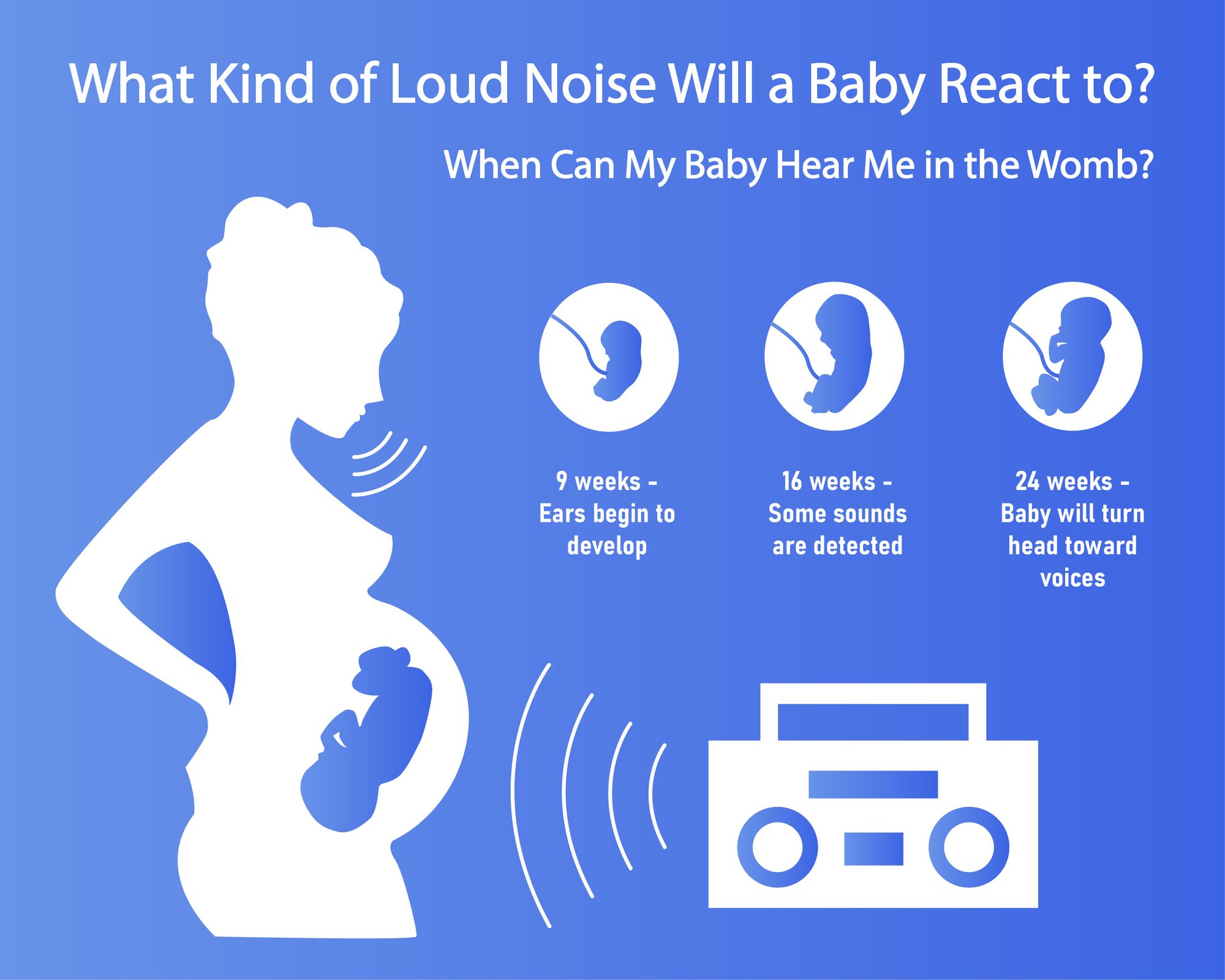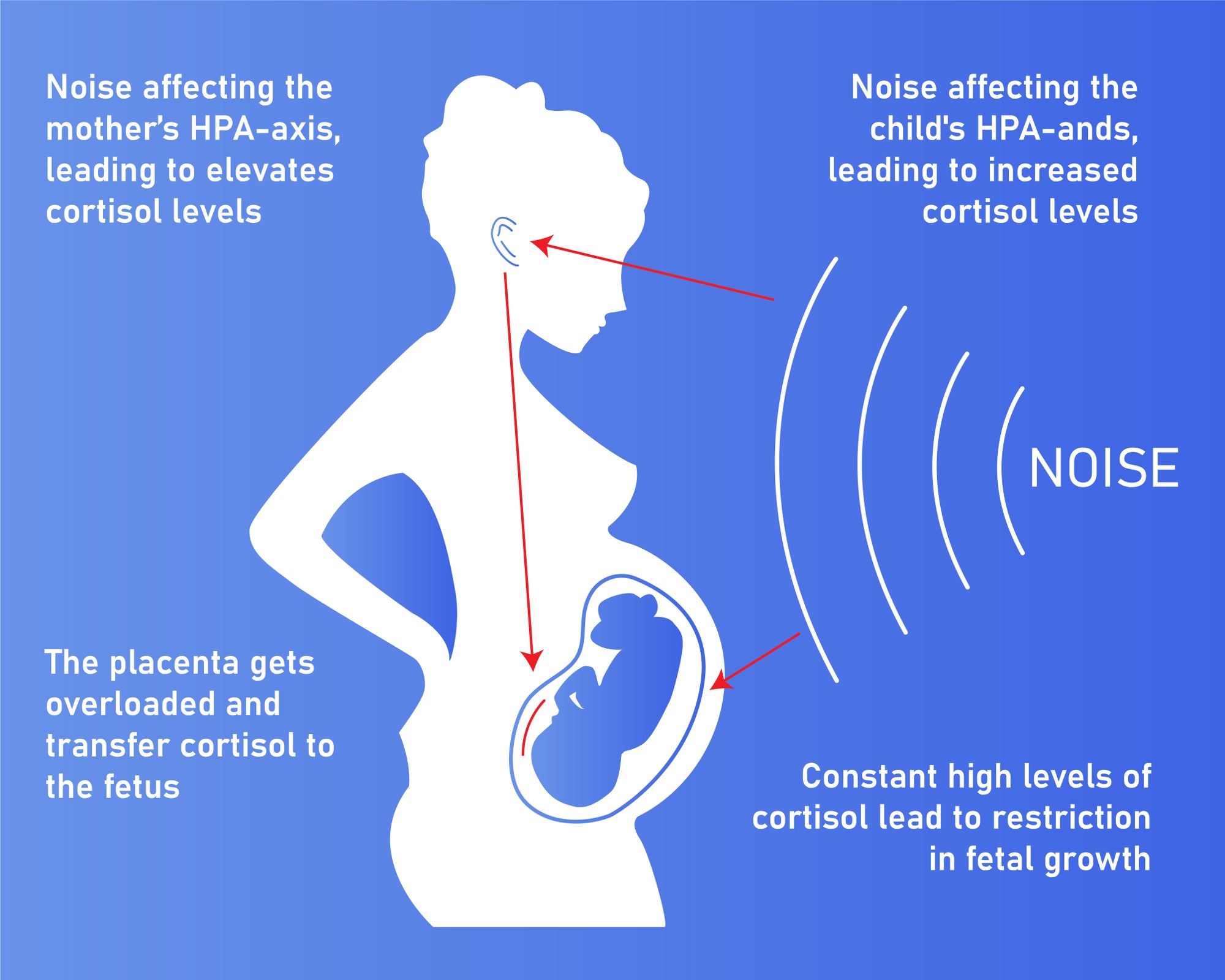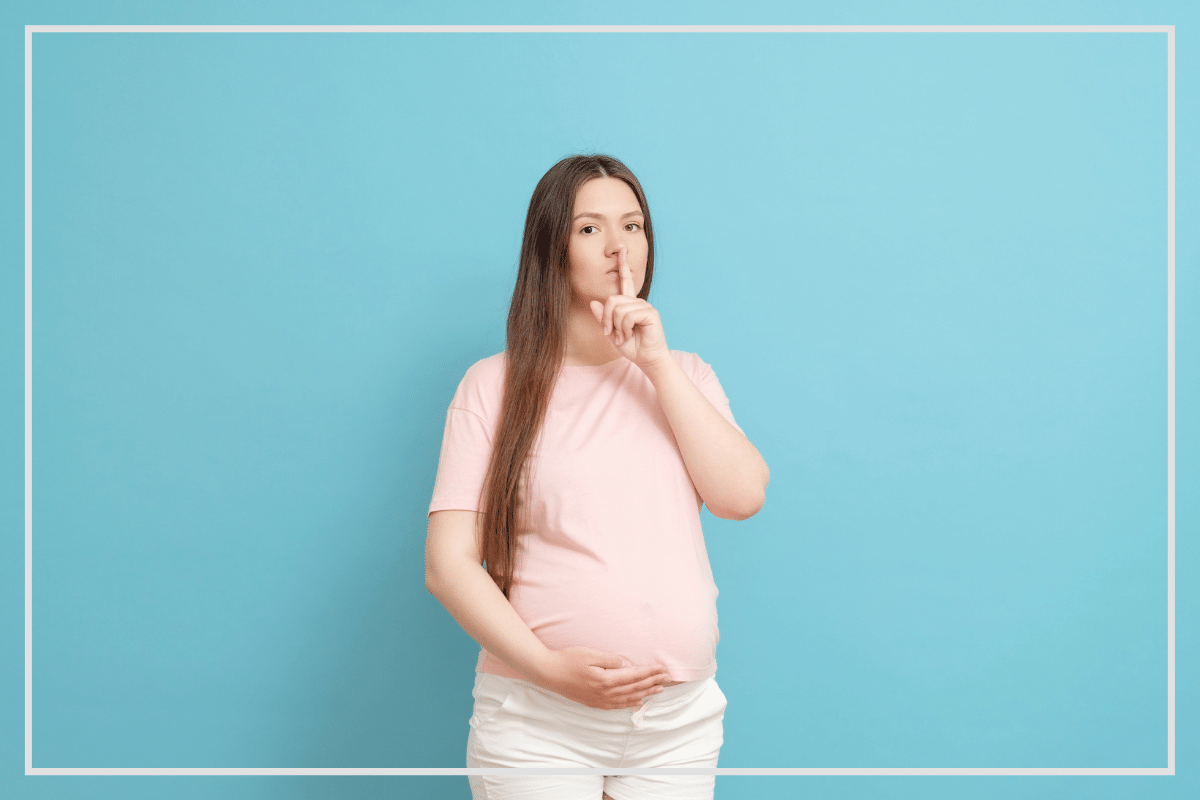- Can Loud Noises During Pregnancy Affect Your Baby
- What Can You Do To Reduce Your Hazardous Noise Exposure
2.1 Protect your developing baby from very loud noise
2.2 Avoid sudden loud noises
2.3 Try to avoid loud sources of noise
2.4 Talk to your doctor about all hazards you have identified at work
2.5 Other useful advices - How To Protect The Unborn From Loud Noise At Work
3.1 Noise at work law and pregnant workers
3.2 Impact on pregnancy
3.3 Employer’s responsibility - What Kind Of Loud Noises Will A Baby React To
- Health Effects Of Loud Noises While Pregnant
- Appropriate Decibel Levels During This Period
6.1 Soundproofing for added protection - Learn More About Loud Noise With Decibel Pro App
When you are expecting a child, it’s only natural to want to protect them as best you can. On top of maintaining a healthy diet and avoiding stress, staying away from loud noises while pregnant is something else you should consider.
In this article, we’re looking into the connection between loud noises and pregnancy and what you can do to protect yourself and your unborn baby.
Can Loud Noises During Pregnancy Affect Your Baby?
There are two perspectives on the impacts of prolonged exposure to loud noises while pregnant. The first is how exposure to loud noises while pregnant affects the mother, and the other is how it affects the fetus.
For the mother, loud noise can be a stress factor. In turn, this stressor can lead to increased blood pressure and an increased heart rate. In turn, this can harm you and the baby.
For the baby, the mother’s long-term stress caused by loud noises while pregnant can:
- increase cortisol levels
- cause stress
- cause sensory and overall development issues
- harm their sensitive hearing
- cause low birth weight
On the other hand, only loud noise has the potential of hurting your unborn baby. Listening to music at a normal level, preferably under 70 decibels can help calm the fetus and encourage their development.
Therefore, your baby should be fine if you avoid exposure to excessively loud or sharp noises like firecrackers, guns, or rock concerts with screaming vocals while pregnant.
What Can You Do to Reduce Your Hazardous Noise Exposure?
For the safety of your baby and your wellbeing, you should avoid exposure to hazardous noise.
Here are a few things you can do to protect your hearing, as well as your baby’s:
Protect Your Developing Baby From Very Loud Noise
Noise levels above 85 decibels are considered loud and harmful to human hearing if the exposure time exceeds 8 hours per day. Noise levels above 120 dB are considered very loud. Exposure to such levels should be limited to only a few minutes.
When you cannot avoid exposure to very loud noise, you must wear hearing protection. However, hearing protection cannot also protect your unborn baby and it can’t prevent noise from traveling to the womb.
Most experts recommend that expecting mothers avoid any exposure to noise levels above 115 dB (the sound level of power drills, chainsaws, rock concerts).
Avoid Sudden Loud Noises
While pregnant, you should pay extra attention to avoiding sudden loud noises like firecrackers, fireworks, or gunshots. Such startling and amplified sounds can cause immediate hearing damage to the mother and also harm the fetus’s hearing or development.
Try to Avoid Loud Sources of Noise
The best way to protect yourself and the baby from the risks of loud noise exposure is to avoid very loud noise altogether.
This means you should:
- avoid loud environments such as concerts, public gatherings, construction sites, factories
- keep your belly far from the source of loud noise
- avoid leaning against a source of loud noise and vibration such as a speaker
If your working conditions include loud noise, you should discuss with your doctor and employer to find solutions to minimize risks.
Talk to Your Doctor About All the Hazards You Have Identified at Work
Your doctor will be able to give you the best advice on how to minimize risks. Whenever you identify a hazard such as loud noise at work or home, discuss with them to see what solutions you can implement.
Other Useful Advice
Other measures you can take to reduce hazardous noise exposure include:
- use a sound meter or a noise dosimeter to measure your daily exposure to loud noises while pregnant
- use a sound level meter app like Decibel Pro to monitor noise levels in your home and your workplace
- if you suddenly find yourself in a noisy environment, move away from the source or leave
- avoid vibrating and low-frequency noise as it can travel to the womb faster
- avoid environments where there is a high risk of impulse noise (gun ranges, airport runways, etc.)
How to Protect Your Unborn Baby From Loud Noise at Work
Going to work is probably something you won’t be able to avoid during pregnancy. This can be dangerous when your workplace includes machinery or equipment that generates a loud noise.
Even so, there are things you can do to protect your wellbeing as well as your baby’s:
Noise at Work Law and Pregnant Workers
Due to the correlations found between exposure to loud noises and pregnancy-related issues, some states have implemented special regulations.
In the UK, the Lower Exposure Action Value is 80 dB and the Upper Exposure Action Value is 85 dB. When noise levels in the workplace exceed these levels, employers must take appropriate action as recommended by HSE.
For childbearing workers, employers must regularly assess the conditions they are exposed to in terms of the nature of the noise, as well as the degree and duration of their exposure.
If the assessment shows noise levels in the workplace can potentially affect the worker’s safety and health or affect their pregnancy, working conditions must be adjusted appropriately.
In the US, the legal limit for noise at work is dictated by OSHA. This limit is currently 90 dBA over an 8-hour workday. No special limits are implemented for pregnant women.
In Sweden, the Swedish Work Environment Authority recommends that pregnant women should avoid noise levels over 80dB(A).
Impact on Pregnancy
The relationship between loud noises and pregnancy has led to many questioning what impacts excessive noise levels can have on pregnant women and unborn babies.
Excessive noise can have various health effects, such as:
- increased blood pressure
- increased stress levels and stress hormone levels
- tiredness
- heart disease
- diabetes
- stress-related fetus development issues
- hearing damage for both the baby and the mother
Employer’s Responsibility
According to the EU 2005 Noise Regulations and the UK Noise at Work Regulations, employers must assess workplace risks relating to excessive noise and implement corrective solutions. These can include:
- adjusting the pregnant worker’s schedule or working conditions to avoid prolonged exposure
- offering the pregnant worker a temporary new position in a more quiet environment
- offering the pregnant worker paid leave for the necessary period
There are no specific responsibilities for employers in the US in this respect.
What Kind of Loud Noises Will a Baby React to?

After the 8th week of pregnancy, the embryo develops into a fetus and their ears start to also develop. Gradually, the fetus will become able to hear and even react to sounds.
Scientists estimate that babies can start hearing muffled sounds in the womb as early as 16 weeks. At 24 weeks, they will start reacting to sounds.
Studies show that the most important phase for the development of a baby’s hearing is between week 25 of pregnancy and, after birth, until the baby is 5-6 months old.
Health Effects of Loud Noises While Pregnant
This study from 2018 set out to establish the connection between exposure to high levels of occupational noise during pregnancy and the risk of low birth weight and underdeveloped babies.
The study showed that the group exposed to noise levels between 75 and 85 dBA registered a statistically small risk. This leads to the conclusion that exposure to higher noise levels (above 85 dBA) will also increase the risks and should therefore be avoided.

As shown in the figure above, noise exposure can activate the sympathetic and endocrine system leading to an increased level of stress hormones. In turn, these stress hormones are transferred to the baby and can slow down their development.
Appropriate Decibel Levels During This Period
To protect your hearing and your baby’s you should avoid exposure to loud noises while pregnant.
Noise levels up to 70 dB are considered safe for human hearing. Noise levels above 85 dB are considered harmful if exposure exceeds 8 hours per day and noise above 110 dB is considered very hazardous even if exposure is limited to a few minutes.
Therefore, to prevent any hearing or health issues, you should avoid situations or environments where amplified sounds or loud sounds above 70 dB can cause stress or hearing damage.
Soundproofing for Added Protection
Soundproofing can be a good way to protect your baby’s hearing even before they are born.
If your home is in a loud neighborhood, you can soundproof the room where you spend most of your time, as well as the baby’s room.
Learn More About Loud Noise with the Decibel Pro App
To monitor noise levels in your home or your workplace and keep your hearing safe especially while pregnant, you can use a sound level meter app like Decibel Pro.
You can easily download Decibel Pro on your iPhone or iPad and use it to get instant noise level readings anywhere you need to.
On top of this, Decibel Pro also comes with a hearing test and a noise dosimeter to track your daily noise dose. This feature is especially useful if you work in a loud environment.
To learn more about the Decibel Pro app, click here.



